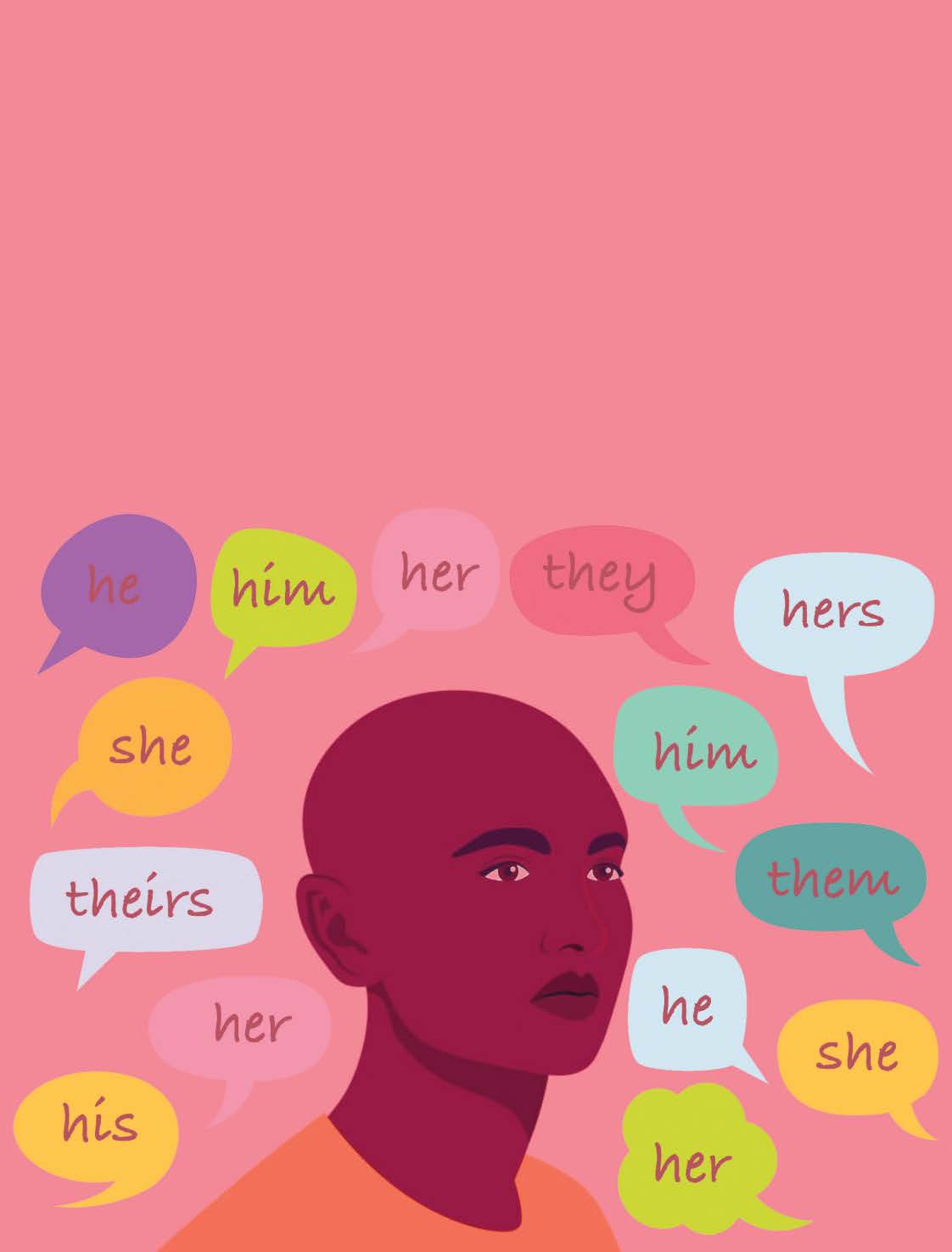WHEN WE "MISGENDER"
A TERRIFIED MAJORITY'S BEGINNER'S GUIDE TO MODERN PRONOUN USE
BY MICHAEL JOHN CARLEY (HE/HIM/HIS)

Mis-gen-der (verb): "to identify the gender of (a person, such as a transsexual or transgender person) incorrectly (as by using an incorrect label or pronoun)" – Merriam-Webster1
Shelve my autism diagnosis for a moment. If you're a regular reader of my writings, think of me temporarily as a straight, primarily white, middle-aged male. Because when I lose the autism, I might, in another universe, belong to a demographic that is terrified by this increasing obligation to both understand, respect, and remember the pronouns of people who might not want to be referred to in the manner in which we would guess. And heck, now that I think about it? Forget the "primarily white" part – as likely equal percentages of people of color also have what we'll forgivingly call, "pronoun-useresistance."
If you live in one of those parts of the world like Green Bay, Wisconsin – from which I just escaped – you may not have a lot of queer, cross-dressing or trans people in your daily lives, or even just people who don't want to be referred to in previously-predictable ways. You might live in a rural, or conservative part of the world where at work, at school, or as neighbors, you don't enjoy people either embracing another gender, rejecting gender itself, or who regard gender as nothing more than a social construct. As in all things undiversified, this hurts you more than you think; for while it simplifies your life, the isolation not only isolates you, you're often not privy to some incredibly beautiful as well as painful lessons about the human experience.
I get the fear!… You see on the internet lots of hip, young people trashing people like "us" because we referred to someone as "him" when they wanted to be called "her" or "them" – or even fancier pronouns like "ver" or "hir" – and you don't want to be called a bigot. AP has articles like "Misgendering is Not a Lightweight Mistake."3 Young bloggers define it as "violence."4 And in California and NY State, intentional misgendering is being incorporated as a legally-defined form of prosecutable harassment. Every time in an email signature you see someone using pronouns below their name or job title, you get annoyed, and think, "What's this world coming to???"
It's not completely new… From a grammatical standpoint, the first recorded use of non-standard pronoun use in the English language came from William H. Marshall, who in 1789 coined the word "ou" to replace either "he," "she," or even "it."2 While not necessarily intended to be linked with sexual or gender identity, this factoid points to more questions than answers; as in other languages, like French, words are assigned genders. En Francais, the word "the" before a noun has more than variant, such as "La," "Le," or "Les," (the latter, for plural). English seems the standard for gender-neutral linguistics. And from an identity standpoint, we used to list two genders, male and female. Then came "intersex" and "transsexual/transgender" to make it four options for identity. When I wrote my The Book of Happy, Positive and Confident Sex for Adults on the Autism Spectrum… and Beyond!"5 in 2016 (though it has only been recently published) I wrote about Facebook's allowing 51 options to describe your gender identity and expression. Well, now we're up to at least 64.6
That's the intimidating part. The real and reassuring truth is that we're not all great brains. And even if we are great brains, no one's forcing any of us to understand or even align ourselves with the politics (though it would be great if we would). We're just asked being asked a bare minimum… to refer to someone in the manner in which they wish to be referred to. You don't have to understand it.
And you certainly shouldn't debate someone about it. The insult to Washington, DC,'s pro football team didn't just center on racist appropriation. The hurt was doubled because one group was asking another not to be referred to in a certain way, and the team was telling them that they were wrong to feel hurt. In the autism world, we felt that way about the word "cure." Growing up, I remember white kids actually defending their use of the N-word by citing that the word was in the dictionary, and that therefore their usage of the word was acceptable. The ideological colonialism if not outright implication that "I don't care if you're offended" just makes the bigotry hurt even more. Also, when marginalized people are defining themselves, the process often doesn't have a finish line. In the autism world, aside from objections to those words like "cure," and "disease," we actually don't agree on much… and that's ok. Over the decades, people of African descent have often changed the words used to describe them. The LGBTQ community has changed that acronym more than once. And this isn't a sign of internal confusion, or of marginalized people who "can't get their &%$* together to decide on a term." It's actually a sign of growth. When any marginalized community is convinced that they are finally allowed to talk freely about who they are (as the very act of marginalization stifles expression), they need time to talk amongst themselves before coming to you with a consensus-driven word that they all agree on. There's catch-up work to be done. They need to debate, disagree, resolve…and then maybe change again once they either learn more about themselves, or about themselves in context with the world's changing attitudes towards them.
When I ended 28 years of New York City living in 2014 for that Green Bay duration, I had maybe 12 colleagues and friends whose pronouns needed remembering. Having no such acquaintances in the Midwest, my discipline for this particular mindfulness went in the trash. Last summer, we moved back east and not only did I need to get that discipline back, but I also had a LOT more than 12 folks whose unique pronounce required memorization (global unique pronoun use having exploded during the six years we were taking care of in-laws). I also work part-time in a Diversity and Inclusion department at NYU, and therein have a huge responsibility to not send signals to people I care about that "I don't care how they want to be referred to, I'm going to call them whatever I want because I think the whole thing is stupid."
Of course the above is not what I'm thinking when I screw up and misgender. But part of what we all have to understand is that there are so many people who DO think that way, and whose fears have driven them to verbally assault, physically assault, and murder trans people in proportionally much larger numbers. Slavery, euthanasia… such unspeakable, and still not-explored-enough horrors can still leave pockets of existence today. But the open season of violence on trans gender people is still rampant, and can be mainstream, i.e., not found in "pockets." Furthermore, a recent wave of anti-transgender legislature7 pushes tells us that the discomfort to some, and hate for others, isn't going anywhere for some time.
So if I misgender – and I have (four times since coming home) "Back now in my spectrum persona, I can also tell you that a higher percentage of our spectrum folks, when compared to the neurotypical world, are LGBTQ. So this issue does affect the spectrum." – and someone really gets offended by it, I have to understand where they're coming from, and not feel unfairly attacked. As to the other three times I misgendered, the people in question know that I'm trying to get that discipline back after slacking in the Midwest, and they accepted my immediate and sincere apology with conviction and reassurance. I have to remember certain folks' pronouns about five times a week so I can safely report I feel the discipline getting better. But I still fear screwing up, and I wouldn't want that changed because it means that I care. It's a responsibility, and an obligation that I embrace, and not resent, because even as an outsider, I can see enough of the pain.
I believe that in the autism world, Autism Speaks still attracts fans who don't know of the organization's horrific past. So we who have autism have to disappointingly accept that our cause is not understood by everyone (yet!). But every once in a while, a spectrum person will cuss out an Autism Speaks fan who simply doesn't (yet!) know any better… and it sucks. If we misgender, and a trans person figuratively beats on us in a way that feels overdone… it sucks. But if we know the history, then we see that the difficulty to forgive is not coming from nowhere. This also happens in every space of diversity and inclusion. It's a process. If diversity was easy, folks like me wouldn't have jobs and we would have all figured this out a long time ago.
In even the most conservative circles can be heard the phrase "be kind." Well, that's really all you need to do. People not like you are asking you to refer to them a certain way. They don't need your opinion of their request. And to give it, isn't kind. It's the opposite. And if you want extra credit, you can be an ally, or you can read about what's historically been done to trans and queer people; or cross dressers – like a wonderful ex-Board member of mine that I reported to when I was a UN rep, and whose recent passing I wrote about in a piece called "The Toughest Boss I'll Ever Have"8). Or you can read books like She's Not There, by Jennifer Finney Boylan… And back now in my spectrum persona, I can also tell you that a higher percentage of our spectrum folks, when compared to the neurotypical world, are LGBTQ. So this issue does affect the spectrum.
I can't speak personally to what it must feel like to have what's called "gender dysphoria," which is when you are uncomfortable in your own body, or with your given name. But I believe that my neighbors aren't lying when they say that through day-to-day misery, the discomfort therein can drive them to extreme mental health challenges. Many who are undergoing the long and arduous surgical road to surgically transitioning, for instance, object to the idea that they are "changing" anything, because they never felt comfortable in their assumed gender to begin with. You can't betray a culture that never accepted you. So many of us look upon this procedure as an act of desperation, but it's the opposite. For many it's the end to feelings of desperation. And given the scrutiny it undergoes from a cruel outside word, must be defined as heroically brave. I'm learning too. But it's like anything else: If you screw up (and misgender), just say you're sorry, and mean it.•
ABOUT THE AUTHOR:

Michael John Carley is the Founder of GRASP, a school consultant, and the author of Asperger's From the Inside-Out (Penguin/Perigee 2008), Unemployed on the Autism Spectrum, (Jessica Kingsley Publishers 2016), The Book of Happy, Positive, and Confident Sex for Adults on the Autism Spectrum… and Beyond!, (Neurodiversity Press 2021), and the column, "Autism Without Fear," which for four years ran with the Huffington Post. Currently he is the part-time Consultant for Disability Inclusive Culture at New York University, a writer for many, and on Mondays he sees individual clients. For more information on Michael John, or to subscribe to his free newsletter, you can go to michaeljohncarley.com.
References
1. merriam-webster.com/dictionary/misgender
2. uwm.edu/lgbtrc/support/gender-pronouns
3. apnews.com/article/fc39633c66ea47a1b803462af95bff84
4. browngirlmagazine.com/2020/06/misgendering-is-an-act-of-violence-and-it-needs-to-stop
6. healthline.com/health/different-genders
7. player.fm/series/the-daily-1354914/a-wave-of-anti-transgender-legislation
8. reader.mediawiremobile.com/epmagazine/issues/206459/viewer?page=21